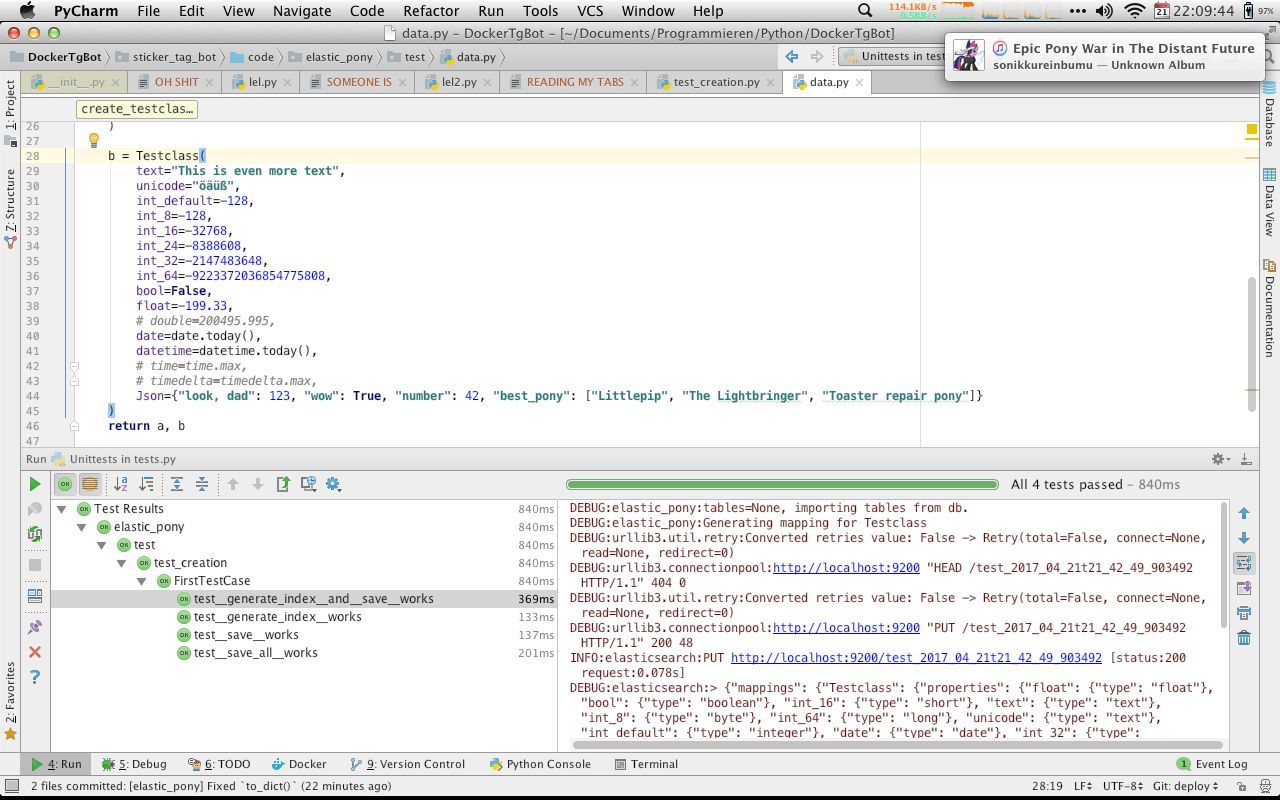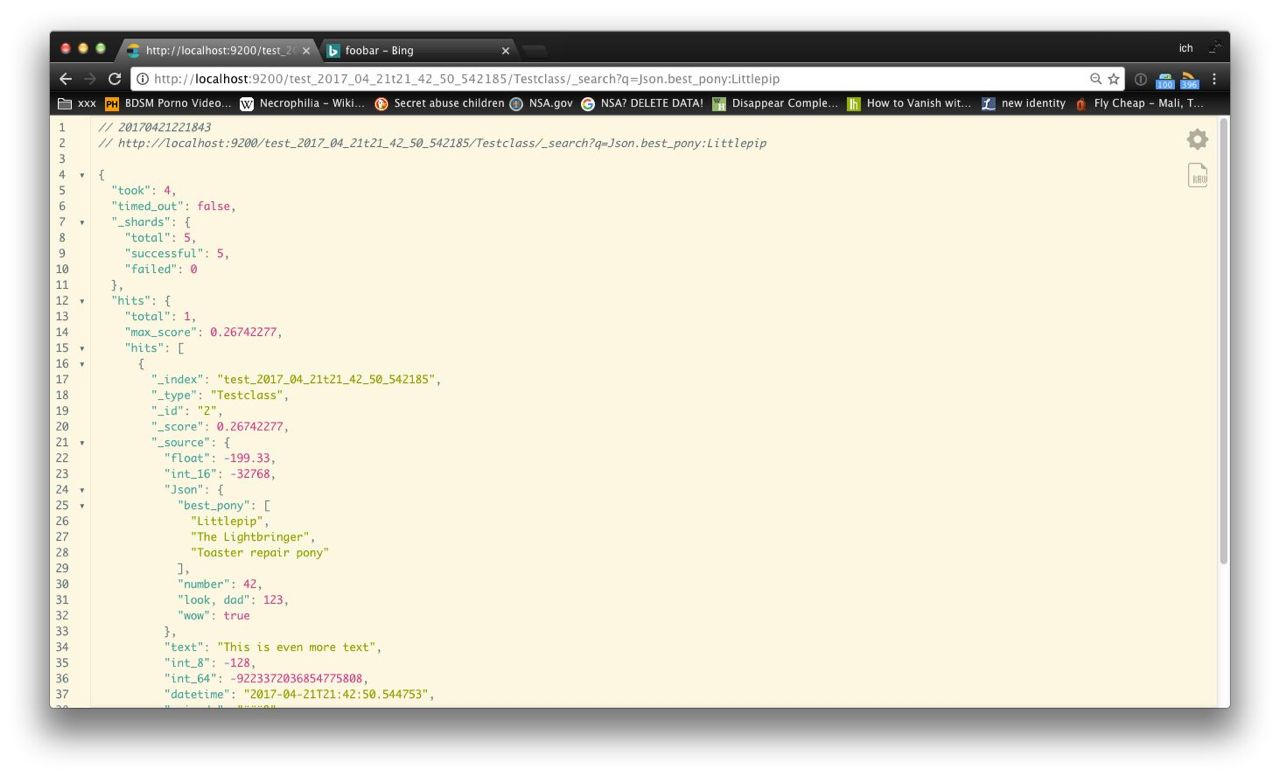 Lucky
Lucky
What is the best way to change out the primary key of a database?
Probably making another database and export/import?
I don't wanna do it manually, would it work to specify two different versions of the database and copy the data in python?
 Lucky
Lucky
 Lucky
Lucky
primary key of a table?
https://editor.ponyorm.com/user/luckydonald/Tags
The `Sticker` table has a `file_id` column, which is PK.
Problem is, Telegram recent changed the way the file IDs are calculated.
So I am required to change 'em all.
Problem is many tables are referring it.
I think the best would to replace it with a Auto increment PK, in case there are future changes.
 Lucky
Lucky
looks like len(Entity.select()) works, is this a fine way of doing it?
Wouldn't this load everything into memory?
I often do sql `SELECT 1 FROM table` to be more efficient
Not sure if needed.
 Alexander
Alexander
any of this:
select(count() for x in MyObject).get()
get(count() for x in MyObject)
MyObject.select().count()
also possible:
select(count(x) for x in MyObject).get()
get(count(x) for x in MyObject)
 Lucky
Lucky
any of this:
select(count() for x in MyObject).get()
get(count() for x in MyObject)
MyObject.select().count()
also possible:
select(count(x) for x in MyObject).get()
get(count(x) for x in MyObject)
With `select`, `count` and `get` being part of `orm.*`?
 Lucky
Lucky
https://editor.ponyorm.com/user/luckydonald/Tags
The `Sticker` table has a `file_id` column, which is PK.
Problem is, Telegram recent changed the way the file IDs are calculated.
So I am required to change 'em all.
Problem is many tables are referring it.
I think the best would to replace it with a Auto increment PK, in case there are future changes.
Also would migration cover such case? Is it worth to wait?
 Alexander
Alexander
I think this case is too hard for migrations, because change of primary key is a very seldom operation and requires complex cascade actions. I suggest you to have two different files with definition of models, connect to both databases and copy objects from one database to another
 Lucky
Lucky
I think this case is too hard for migrations, because change of primary key is a very seldom operation and requires complex cascade actions. I suggest you to have two different files with definition of models, connect to both databases and copy objects from one database to another
So I'd be like
from fileA import Object as ObjectA
from fileB import Objekt as ObjectB
page_size = 1000
page_num = 1
while True:
with db_session:
objects = ObjectA.select(). \
order_by(ObjectA._pk_). \
page(page_num, page_size)
For obj in objects:
ObjectB(arg1=obj.arg1, arg2=obj.arg2, arg3=obj.arg3, ...)
if len(objects) < page_size:
break
page_num += 1
(typed and copy pasted with phone, lol)
 Alexander
Alexander
If you want, you can access entity classes as db attributes, sometimes it may be more convenient
from models1 import db as db1
from models2 import db as db2
select(x for x in db1.Object)
 Alexander
Alexander
Regarding counting the number of objects, actually the shortest form is:
orm.count(x for x in MyObject)
 Alexander
Alexander
len(Entity.select()) form creates all objects in Python, it may be slow and consumes much memory. Other forms just counting the number of rows directly inside the database
 Lucky
Lucky
Regarding counting the number of objects, actually the shortest form is:
orm.count(x for x in MyObject)
I am curious, what sql statement does it use?
SELECT 1 FROM table?
 Lucky
Lucky
Because it doesn't need to look at the rows content, but can just count a simple object, here a simple 1?
 Alexander
Alexander
No, it compiles to the same query plan
https://asktom.oracle.com/pls/apex/f?p=100:11:0::NO::P11_QUESTION_ID:1156159920245
 Lucky
Lucky
http://www.revsys.com/blog/2006/aug/04/automatically-updating-a-timestamp-column-in-postgresql/
 Lucky
Lucky
I don't wanna do it manually (ssh'ing into the server etc.)
Also, is there already a Pony abstraction for triggers?
 Alexander
Alexander
No, triggers are typically very database-specific. Right now we are creating them manually.
Maybe you can write a script which creates a trigger using db.execute(...)
 Lucky
Lucky
Best would be to have a version table, and with that I can store what migrations already were processed?
 Alexander
Alexander
We have such table in our migration tool. I want to finish it, but have no enough time for it, because I'm involved in other projects and they cosume all the time. I really hope that the next week I can concentrate on finishing migration tool
 Lucky
Lucky
Is it possible to disable $foo automatic resolving, and force it to be needed to manually provide them, like:
db.execute("SELECT * FROM Table1 WHERE column1 = $x and column2 = $(a + b)", x="foo", a="some", b="string")
?
 Alexander
Alexander
sql = "SELECT * FROM Table1 WHERE column1 = $x and column2 = $(a + b)"
var_dict = {"x": "foo", "a": "some", b: "string"}
db.execute(sql, var_dict)
 Lucky
Lucky
Something different.
I am trying to use obj.to_dict(), but get
File "/Users/luckydonald/Documents/Programmieren/Python/DockerTgBot/sticker_tag_bot/code/elastic_pony/data.py", line 8, in default__to_dict
return obj.to_dict(obj)
File "<string>", line 2, in to_dict
File "/Users/luckydonald/Documents/Programmieren/Python/DockerTgBot/virtualenv3.5.1.venv/lib/python3.4/site-packages/pony/utils/utils.py", line 58, in cut_traceback
return func(*args, **kwargs)
File "/Users/luckydonald/Documents/Programmieren/Python/DockerTgBot/virtualenv3.5.1.venv/lib/python3.4/site-packages/pony/orm/core.py", line 4842, in to_dict
attrs = obj.__class__._get_attrs_(only, exclude, with_collections, with_lazy)
File "/Users/luckydonald/Documents/Programmieren/Python/DockerTgBot/virtualenv3.5.1.venv/lib/python3.4/site-packages/pony/orm/core.py", line 4073, in _get_attrs_
if only and not isinstance(only, basestring): only = tuple(only)
TypeError: 'Testclass' object is not iterable
 Lucky
Lucky
Instead of obj.to_dict(obj) you need to write just obj.to_dict()

 Alexander
Alexander
How does Pony handle float/double?
Pony represents float/double database type as float type in Python (which actually has double precision). The type of a database column which Pony creates is DOUBLE PRECISION. You can specify sql_type='real' if you want to create a column with a single precision
 Lucky
Lucky
 Lucky
Lucky
 Lucky
Lucky
page_size = 1000
page_num = 1
while True:
with db_session:
objects = MyObject.select(). \
order_by(MyObject.id). \
page(page_num, page_size)
process_objects(objects)
if len(objects) < page_size:
break
page_num += 1
Can I store the query until page(page_num, page_size) outside of the while loop?
Like this:
page_size = 1000
page_num = 1
with orm.db_session:
query = table_clazz \
.select() \
.order_by(table_clazz._pk_)
if last_modified:
query = query.filter(lambda elem: elem.modified > last_modified)
# end if
while True:
objects = query\
.page(page_num, page_size)
yield from objects
if len(objects) < page_size:
break
# end if
# end while
page_num += 1
# end with
 stsouko
stsouko
Hello! Why pony do lazy load for queries like: select((x, y) for x in X for y in Y if x.key1 == y.key2)
 Alexander
Alexander
So with yield from objects it does, and I can't do that. Thanks.
I mean, if you create initial query outside of db_session, and retrieve objects later inside db_session (as you do) it probably should work. But this is not tested
 Alexander
Alexander
Hello! Why pony do lazy load for queries like: select((x, y) for x in X for y in Y if x.key1 == y.key2)
Pony do this because if you retrieve several objects at row like select((x, y) ... then there may be duplicates, and if query contains grouping it may interact badly with some column types like BLOB, etc. Because of this, Pony retrieve only primary keys, and load other attributes in a separate query. In many cases it should be more efficient than to retrieve objects with duplicates in a single query
 stsouko
stsouko
I have 2 attr in X and 1 in Y except primary key. I use Mixins for convert attr from db to python objects.
 Lucky
Lucky
Does pony automatically creates new Tables if I add a db.Entity, and use db.generate_mapping(create_tables=True), even if there already are Tables?
 Alexander
Alexander
Is it possible preload all attrs?
Currently there is no way to load pairs of objects in a single query, but I don't think the additional query hurts performance much in this case, especially if the additional field is of JSON type
 Alexander
Alexander
Does pony automatically creates new Tables if I add a db.Entity, and use db.generate_mapping(create_tables=True), even if there already are Tables?
Yes, Pony will create table automatically. But if your previous entity references newly added entity, it may be necessary to add column to a previous table


 Alexey
Alexey
